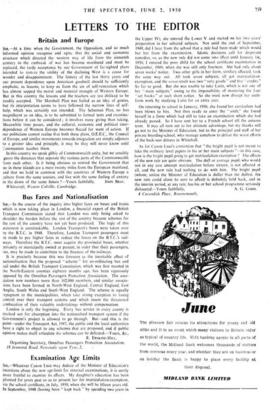Examination Age Limits
Sta,—Whatever Canon Luce may deduce of the Minister of Education's intentions about the new age-limit for external examinations, it is surely more fruitful to examine its effects. My daughter's education has been planned for years past so as to present her for matriculation-exemption, via the school certificate, in July, 1950, when she will be fifteen years old. In September, 1948 (having been " kept back " by spending two years in the Upper IV), she entered the Lower V and started on her two years' preparation in her selected subjects. Not until the end of September, 1949, did I hear from the school that a rule had been made which would bar her from the examination. Idiotic decisions call for desperate remedies, so, as the new rule did not come into effect until January 1st, 1950, I entered the poor child for the school certificate examination in December, 1949, when she was still only fourteen. She had only about seven weeks' notice. Two other girls in her form, similary affected, took the same way out. All took seven subjects, all got matriculation- exemption, and the worst result was two " very goods " and five " credits." So far so good. But she was unable to take Latin, which is not one of her " main subjects," owing to the impossibility of mastering the four " set books " at such short notice. So she must now disrupt her sixth- form work by studying Latin for an extra year.
On returning to school in January, 1950, she found her curriculum had been blown to bits. Not then ready to enter the " sixth," she found herself in a form which had still to take an examination which she had already passed. So I have sent her to a French school till the autumn term. It may all turn out to her ultimate advantage, but my thanks will go not to the Minister of Education, but to the principal and staff of her private boarding-school, who manage somehow to defeat the worst efforts of the back-seat drivers in Whitehall.
As for Canon Luce's contention that " the bright pupil is not meant to take the ordinary level papers in his or her main subjects "—in this case, how is the bright pupil going to get matriculation-exemption ? The effects of the new rule are quite obvious. The dull or average pupil, who would not in any case attempt matriculation before sixteen, is not affected at all, and the new rule had nothing to do with him. The bright pupil (whom, unless the Minister of Education is duller than the dullest, the new rule could alone be seen to affect) is definitely held back, and in the interim period, at any rate, has his or her school programme seriously
dislocated.—Yours faithfully, A. G. GADO. 4 Cavendish Place, Bournemouth.


































 Previous page
Previous page